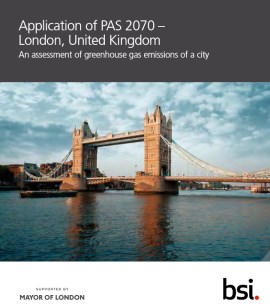
by Brianna Crandall — August 8, 2014—BSI, the U.K.-based business standards company, published a new specification at the end of 2013 to help city decision makers take a more holistic approach to assessing and measuring the impact of greenhouse gas (GHG) emissions. PAS 2070—Specification for the Assessment of Greenhouse Gas Emissions of a City—was sponsored by Greater London Authority and provides a transparent methodology for the consistent, comparable and relevant quantification, attribution and reporting of GHG impacts at an urban level.
Making cities more sustainable is one of the most vital challenges of modern times, especially as they exert a significant impact on the environmental status quo. Therefore a greater emphasis placed on measurement of emissions and access gained to good quality data on GHG emissions is crucial, asserts BSI. PAS 2070 enables city decision-makers to clearly identify emission sources and their drivers, reduce the carbon dependence of their economy, and stimulate opportunities for more efficient urban supply chains.
In order to assist users and provide clarity on specific technical aspects of PAS 2070, a London city case study has been published. The London case study, which has been nominated for a Siemens C40 award, includes guidance on data collection and quantifying emissions, and provides a template for reporting.
David Fatscher, head of market development for sustainability at BSI, said, “PAS 2070 adds a new, community-focused dimension to BSI’s expanding family of standards on greenhouse gas management. The standard provides a robust framework which encourages best practice carbon management of urban areas. Those implementing PAS 2070 will gain a clearer understanding about how their city generates emissions and will therefore be better placed to assess risks and opportunities.”
PAS 2070 gives requirements for assessing GHG emissions from two sources:
- Direct emissions from within the city boundary—the direct plus supply chain (DPSC) methodology, which focuses on activities such as energy use by homes and businesses located in a city, transport serving them, and the provision of resources and services to the city; and
- Indirect emissions from goods and services produced outside the city boundary and consumed within the city boundary—the consumption-based (CB) methodology focuses solely on economic final consumption activities from households, governments and business capital investments located within the boundary.




